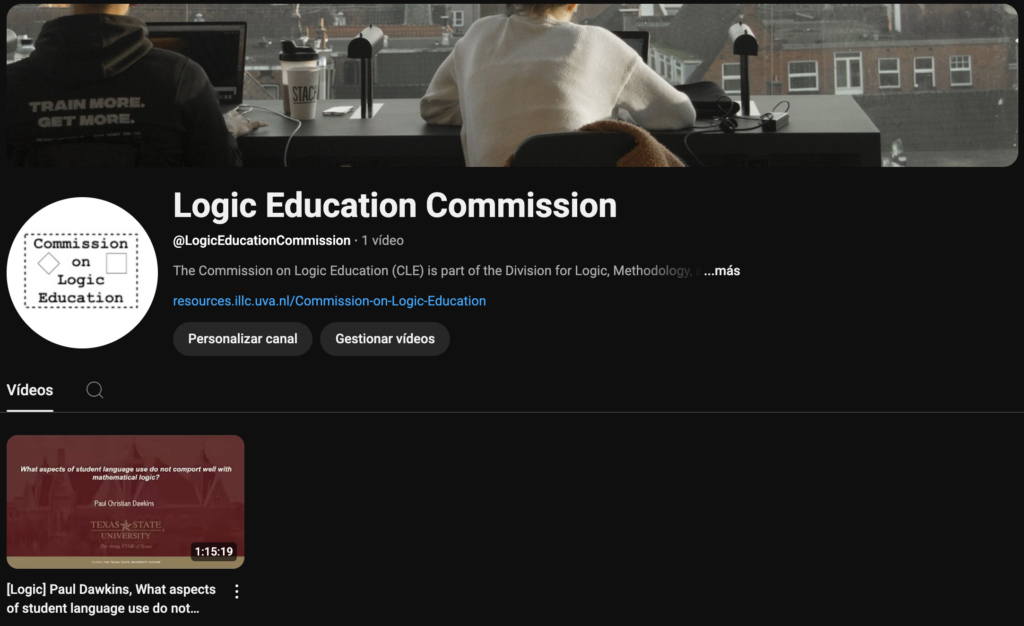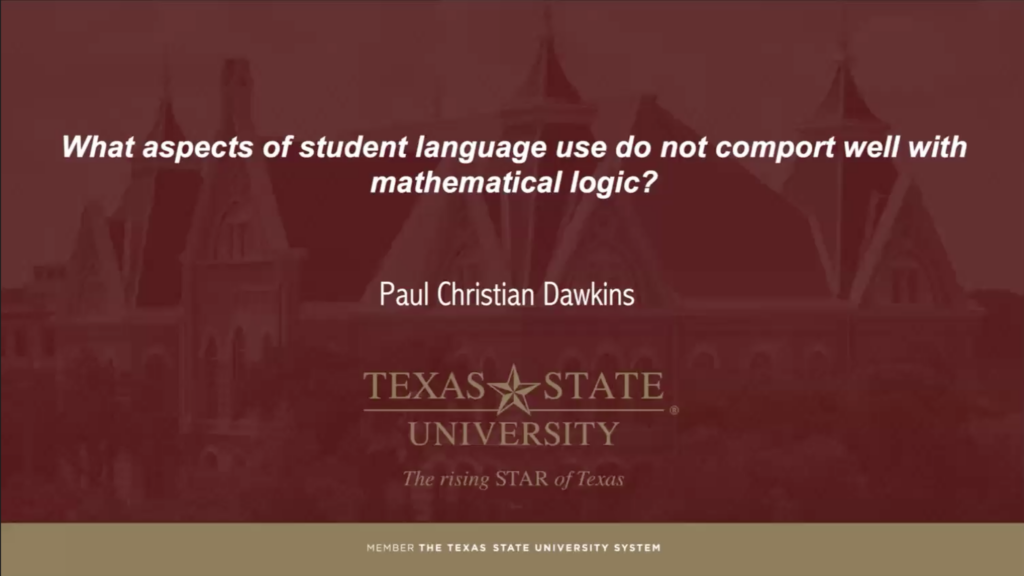Upcoming Events
[External | Recommended by CLE] Fall 2025/26 Course, University of Bremen: Argumentation, Proof and Proving
Course D5-1: Argumentation, Proof, and Proving
Instructors: Dr. Knipping & Dr. Papadaki,
University of Bremen
Course Period: 07/11/2025 – 06/02/2026
Start Date: 7th November 2025 8:00-10:00 CET
Zoom ID for all meetings: 616 4799 4734
Course Information:
Mathematical proof is often equated with formal proof, where statements are considered true when they are deductively derived and formally represented within a mathematical theory. Proofs in this formal sense are widely recognized as difficult and challenging to understand. However, such proofs are rarely found in school mathematics, as the school curriculum is not structured as an axiomatic system. This creates a divide between different realms of mathematics: academic mathematics at the university level, where formal proof is central, versus school mathematics and applied mathematics, where proof struggles to find a meaningful place. This phenomenon reflects
what Felix Klein (1932) described as a discontinuity in mathematics education—the conceptual and structural gap between school and university mathematics, which makes the transition between these levels challenging both for learners and teachers.
From the perspective of learning and understanding mathematics, this discontinuity highlights the limitations of a solely formal view of mathematical proof, rendering it problematic. Mathematical knowledge is more than an accumulation of facts and procedures; it is an active understanding of properties and concepts that humans create and use. To bridge the gap that Klein identified, we
need to provide students with opportunities to experience this kind of knowledge and familiarize themselves with a conception of proof that emphasizes the practice of proving and reasoning –
that is, the processes of developing mathematical arguments and proofs. Such an approach highlights the social dimension of proof, which includes the negotiation and acceptance of proofs
within a community, both in the classroom and in the broader mathematical community. Argumentation, understood as providing reasons for mathematical statements, plays a crucial role in this perspective.
In this course, significant publications and scholarly work in the area of argumentation, proving, and reasoning in mathematics education are studied and discussed. The concept of mathematical proof is examined from an educational perspective, broadening its traditional meaning. A more process-oriented and socially situated understanding of proof is emphasized, one that considers diverse social and cultural contexts of education – from primary to high school, and from academic programs to engineering programs at the tertiary level. Furthermore, different theoretical frameworks and approaches are explored to capture a nuanced and complex picture of what mathematical proof actually is and can be.
Active and extensive reading is expected in this course. A discussion format taking place every two weeks will support the study of a broad range of publications. For students who require credit points for their Master’s or PhD program, the design of a learning environment is required. This environment should foster proof and proving in a specific educational context and be grounded in the studied literature.
For colleagues who are interested in discussing matters of proof and proving in teaching and education more generally, this course serves as an open forum to interact with Master’s and PhD students, as well as interested scholars and colleagues.
Reference
Klein, F. (1932). Elementary mathematics from a higher standpoint: Arithmetic, algebra, analysis (E. R. Hedrick & C. A. Noble, Trans.). Dover Publications. (Original work published
1908)
Course Schedule:

Watch past events in the Commission’s YouTube Channel https://www.youtube.com/@LogicEducationCommission

Subscribe to the Logic Education mailing list!
By following this link: https://list.uva.nl/postorius/lists/logic-and-education.list.uva.nl
Are you organising an upcoming event on Logic Education?
Email commission.logic.education@gmail.com with the event information, and we would be happy to add your event! Thank you for your contributions 🙂
Past Events
11/08/2025: What aspects of student language do not comport with mathematical logic? By Paul Christian Dawkins
Recording on YouTube: https://youtu.be/UC8dKFBGsOk

What aspects of student language use do not comport with mathematical logic?
Speaker: Paul Christian Dawkins,
Professor of Mathematics,
Texas State University
Date: August 11, 2025
Time: 0800 hours (Dallas)
1000 (Brasilia) 1500 (Paris)
1830 (Bangalore) 2100 (Beijing)
Abstract:
Based on over a decade of experiments working to support students in reflecting on their use of mathematical language to help them reinvent some basic logical structures, I have gained some insights about university students’ untrained interpretations of mathematical language.
Combining these empirical findings with insights from psychology, pragmatics, and linguistics, I have come to appreciate the coherence and rationality of students’ language use even when it proves incompatible with logical structure.
In this talk, I will share some stories of student thinking that have given me some helpful insight into how their language use differed in important ways from mathematical language use. Hopefully, these contrasts will help instructors and researchers understand the challenges that logic instruction must overcome to support students in formalizing and systematizing their reasoning about mathematical language.
14-16/04/2025: BCTCS 2025, University of Strathclyde – Education Track
BRITISH COLLOQUIUM FOR THEORETICAL COMPUTER SCIENCE (BCTCS) 2025 Education Track
Conference, University of Strathclyde
Date: April 14-16, 2025
Website: https://msp.cis.strath.ac.uk/bctcs2025/
CONTRIBUTED TALKS
This year BCTCS will host a focused Theoretical Computer Science Education Track on Wednesday the 16th of April.
To propose a talk, please fill in the submission form.
We invite 20 or 30 minutes talk proposals on teaching experiences, highlighting specific challenges and/or innovations related to particular theoretical computer science topics or courses. This track is designed to facilitate reflection on both the breadth and depth of TCS topics offered across institutions, from introductory courses to advanced topics such as computational complexity theory, quantum computing, algorithmic game theory, model checking, programming language theory and semantics, to name a few. A central theme of this event will be exploring how TCS can continue to serve as a foundational element of computer science education, with challenges lying in keeping students engaged and demonstrating relevance considering emerging technologies like generative AI.
We put no restrictions on the originality or publication status of submissions. There will be no formal proceedings, but the collection of the contributed abstracts will appear in the Bulletin of the EATCS.
REGISTRATION
We hope to open registrations in March 2025. The registration fees will be as follows:
– Early registration (until 24 March): £45
* Late registration (until 7 April): £60
TCS Education Track Chairs:
– Oana Andrei, University of Glasgow. https://www.gla.ac.uk/schools/computing/staff/oanaandrei/
– Alasdair Lambert, University of Strathclyde. https://www.strath.ac.uk/staff/lambertalasdairmr/,
Further details are available at https://msp.cis.strath.ac.uk/bctcs2025/ or contact directly the education track chairs.
This event is sponsored by SICSA, the Scottish Informatics and Computer Science Alliance
08/04/2025: Webinar on logic education (Tools for Teaching Logic) by María Manzano
Webinar on logic education: Tools for Teaching Logic
Speaker(s): Professor María Manzano
Date: April 8, 2025
Time: 10:00 New York, 14:00 GMT, 16:00 Amsterdam, 19:30 Bangalore, 22:00 Beijing
Abstract:
I will tell you about the European ALFA project on Tools for Teaching Logic that we had last century and about the International TTL Congresses that we held in 2000, 2006, 2011, 2015, and 2023.
The first goal of the ALFA project was to share our experience as teachers among Aracne members. We proposed: (1) the preparation of a metabook (with hypertext version), (2) the design of an on-line dictionary of logic terms, (3) the investigation of the existing software for the teaching of logic, (4) the translation of both elementary and interdisciplinary texts and software, (5) to help potential authors to write lecture notes, (6) the dissemination of our project both within our academic community and outside it (high school), thus bolstering a good image of Logic and (7) to support women’s participation in higher education.
The network we created was interdisciplinary and included professors and researchers from philosophy, mathematics, computer science, and linguistics. Some of the results of the project can be consulted on the Aracne website (aracne.usal.es) and others in the Summa Logicae digital library (logicae.usal.es)
Speaker Bio:
María Gracia Manzano Arjona is a Spanish philosopher specializing in mathematical logic and model theory. Manzano earned her Ph.D. in 1977 from the University of Barcelona. Her dissertation, Sistemas generales de la lógica de segundo orden [General systems of second-order logic], was supervised by Jesús Mosterín. She is a professor of logic and the philosophy of science at the University of Salamanca. She is the author of several books on logic and model theory.
07/02/2025: Panel discussion on logic teaching, AWPL
Panel discussion on logic teaching
Panellist(s): Johan van Benthem, Mihir Chakraborty, and Sujata Ghosh
Moderator: R. Ramanujam
Date: February 7, 2025
Time: 14:30-15:30
This panel discussion will take place during AWPL (Asian Workshop on Philosophical Logic), Feb 6-8, 2025,
Jadavpur University, Kolkata, India
05/02/2025: Panel discussion on careers and education in logic, ICLA 2025
Panel discussion on careers and education in logic
Speaker(s): Janos Makowsky, Anil Nerode, R Ramanujam, Shashi Srivastava, R Venkatesh
Date: February 5, 2025
Time: 16-17:30
This panel discussion will take place during ICLA (Indian Conference on Logic and Applications), Feb 3-5, 2025,
Indian statistical institute, Kolkata, India
14/01/2025: Webinar on Machine Learning and Logic: Fast and Slow Thinking by Professor Moshe Vardi
Webinar: Professor Moshe Y. Vardi, Rice University
Machine Learning and Logic: Fast and Slow Thinking
Date: January 14, 2025
Time: 0700 CST, 1300 GMT, 1400 CET, 1830 IST, 2100 (Beijing)
Computer science seems to be undergoing a paradigm shift. Much of earlier research was conducted in the framework of well-understood formal models. In contrast, some of the hottest trends today shun formal models and rely on massive data sets and machine learning. A canonical example of this change is the shift in AI from logic programming to deep learning.
I will argue that the correct metaphor for this development is not paradigm shift, but paradigm expansion. Just as General Relativity augments Newtonian Mechanics, rather than replace it–we went to the moon, after all, using Newtonian Mechanics–data-driven computing augments model-driven computing. In the context of Artificial Intelligence, machine learning and logic correspond to the two modes of human thinking: fast thinking and slow thinking. The challenge today is to integrate the model-driven and data-driven paradigms. I will describe one approach to such an integration — making logic more quantitative.
I will conclude by discussing implications for computer-science education.
10&13/07/2024: International group discussion on logic and computing education, ICME-15 2024
International group discussion on logic and computing education
Speakers: Viviane Durand-Guerrier, Kyeyong Hah-Roh, R Ramanujam and Sebastian Sequoia-Grayson
Date: July 10 and 13, 2024
Group discussion took place during ICME-15 (the 15th International Congress on Mathematics Education), July 7-14, 2024, Sydney, Australia
